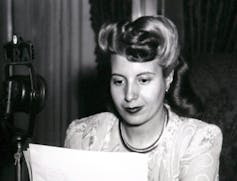The death of 81-year-old Winnie Madikizela-Mandela has plunged many South Africans into grief. Her story and legacy of struggle is being remembered and examined.
Her death comes at a critical point in the country’s history: the end of former president Jacob Zuma’s traumatic and tumultuous leadership. The “Zuma years” tore apart the African National Congress (ANC) government. It also hobbled the economy and polarised the nation. The ANC, which has dominated since inclusive democracy in 1994, is now weakened.
Against this backdrop Madikizela-Mandela’s death is a bittersweet reminder of what the ANC – the foremost national liberation movement on the African continent – symbolises. It also evokes memories of the unwavering idealism and courage of the men and women who fought long and hard in the name of freedom. The nation is now, probably for the first time since 1994, taking serious pause and truly reflecting on what the ANC revolutionaries sacrificed for this country.
Madikizela-Mandela’s legacy is being reconsidered, too. There’s been a national outpouring of tributes commemorating her as freedom fighter, revolutionary, activist and Mother of the Nation. These affirming narratives are a counterpoint to the serious controversies that seemingly tarnished her political career and legacy in the latter years of her life: the criminal activities of her Mandela United Football Club in the 1980s, unanswered questions around the kidnapping and murder of teenage activist Stompie Seipei in 1989 and her convictions for fraud.
There are echoes in this reclaimed narrative of the Evita effect. The way Madikizela-Mandela is being remembered recalls the outpouring of grief and iconic status Eva Peron, the First Lady of Argentina who was known as Evita, was accorded after she died in 1952. Evita’s powerful legacy lives on today. She has attained almost mythical proportions in her country.
Winnie Madikizela-Mandela and Evita Peron are two different women from a different historical time, context, culture and geopolitical space. This is not an attempt to compare them. But there are some interesting parallels that explain how such women, despite their conflicted national identities and flawed personas, powerfully elicit a national outpouring of grief and capture the imagination of the people.
Idealised, iconic women
Evita was described in the weeks after her death as
ambitious, ruthless, untiring, clever and strikingly beautiful.
Madikizela-Mandela is also a disputed and even divisive national figure.

Beautiful Evita’s reputation is disputed in Argentinian politics. She is venerated for her fight for women’s suffrage and her mission to uplift the masses – the ‘misdescamisados’ (“my shirtless ones”), as she named them. Similarly, the beautiful Winnie’s struggle legacy strongly emerges as one that gives voice to the voiceless. She championed the marginalised, the downtrodden and the “poorest of the poor”.
Such women achieve powerful iconic and even mythical status by embodying the idealised woman. They are better than reality and imbued with the essence of the feminine. They are primarily remembered for their beauty, style, charm, empathy and compassion for the downtrodden, the marginalised and vulnerable.
Idealised, they are easily recognisable and accessible to the masses that seek to embrace their memory. Dissenting narratives that do not affirm and sustain the mythical storyline are eroded.
Feminine archetypes
Evita and Winnie are feminine archetypes, dubbed the Spiritual Leader of the Nation and the Mother of the Nation respectively.
In the patriarchal tradition, such women also become repositories for the nation’s angst. They come to serve as a catharsis for the communal memories and pent up, enmeshed emotions of love, fear, humiliation, anger – and even hate.
What is seared in the world’s memory are the globally televised images of Nelson Mandela and his then wife Winnie walking hand-in-hand, with their raised Black Power salutes. This image is now tinged with sadness when we are poignantly reminded how isolated and cast aside Winnie was so many times in her life:
In the whirlwind of events following Mandela’s release from prison and the start of negotiations designed to ensure a peaceful transition rather than a bloodbath in South Africa … no one bothered to find out what Winnie needed and wanted, how her life had changed or what her aspirations might be…
If the recent outpouring of tributes to Winnie Madikizela-Mandela’s indomitable spirit is any indication, then the long lens of history could raise her to mythical heights. With the Evita effect she may achieve the national recognition, veneration and empathy that was not afforded to her in life and the kind of iconic status that she, as a woman, could never have imagined.

